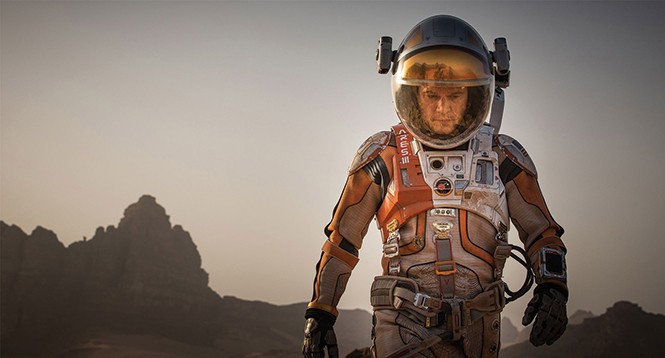
"I'm going to have to science the shit out of this," says Mark Watney (Matt Damon) early in The Martian—and it's hard to imagine a more essential manifesto for the 21st century. Watney, as it happens, has no choice in adopting that ethic: A member of a six-person research expedition to Mars, he's been left behind after a massive storm forces them abruptly to abort the mission, and he's lost and presumed dead when his suit's vital-signs indicators go offline. He's staring down the reality of his situation from the "hab" (living quarters) left on the planet's surface: Nobody knows he's alive to send a rescue. The next manned mission isn't scheduled to arrive for another four years. And he doesn't have enough food to survive that long.
On its most basic level, The Martian is merely a procedural, mixing a little Cast Away with a lot of Apollo 13 while addressing the nuts and bolts of how a single human, stranded in a place where a single human isn't supposed to be able to survive, might somehow manage to do exactly that. But director Ridley Scott (Alien) and screenwriter Drew Goddard (Cloverfield), while adapting Andy Weir's novel, have put together something that's even more than a simple testament to good old-fashioned American ingenuity. It's a celebration of the idea that a problem is something that can be solved, if you're prepared to set aside all the distracting nonsense and—as Watney puts it late in the film—"just begin."
The narrative swings primarily between Watney's ongoing efforts to map out a survival strategy and events on earth, where satellite images eventually clue officials at NASA—including Mars mission chief Kapoor (Chiwetel Ejiofor) and NASA's director (Jeff Daniels)—into the fact that he's actually still alive. It winds up being crucial that we get both perspectives, and not just for the fundamental necessities of plot. While Watney's obstacles are basically his limited resources and the inhospitable environment, the NASA crew faces even more issues than the ones that can be solved by science while up against a ticking clock: Can they get the funding needed for whatever they come up with? How can they spin the P.R. of having mistakenly reported Watney as dead, and leaving him behind? Should they inform the rest of Watney's team—led by Captain Lewis (Jessica Chastain)—that he's still alive? The Martian reminds us that it's a complex equation, this matter of problem-solving, because there are always people involved, and people are complicated, sometimes irrational creatures.
Watney himself is one of those people, and Damon's performance turns him into a guy with a sardonic sense of humor that helps keep him going even when his prospects look bleak. But there's an element to the character that's more than just his entertaining punch lines; what we see in his video diary entries is simple pride in the notion that he's applying his training and intelligence in a way that's working (at least most of the time). There's a giddiness to Watney that feels like a characteristic of so many pioneers, something that translates as, "Sure, there are risks involved, but isn't it amazing that this thing is possible, and that I'm someone who's doing it?"
It's true that The Martian strips most of the other characters to the level of their most rudimentary narrative functionality, even if there's a satisfying diversity among those characters. It's similarly true that the story takes on a cyclical quality, as either Watney or the NASA team comes up with some sort of plan, experiences initial success, then has to regroup after facing unexpected setbacks.
Yet far from being a bug in the structure of The Martian, that repetition is a feature. At its core, it's a survival epic in which the hero is the scientific method: developing testable theories, gathering the data, refining the tests, sometimes going back to the drawing board. And the sheer dogged determination of these people to find something that will work—trying, failing, re-trying, re-failing, re-re-trying—makes it not just exciting on a storytelling level, but inspirational. Anyone choosing to nit-pick the scientific specifics of The Martian is missing the point. With a succession of potential catastrophes sometimes seeming to add nothing but shit into the modern world, it's wonderful to consider the possibility that we could science that shit out of it.
THE MARTIAN